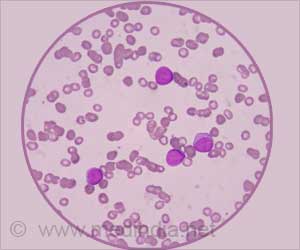Some people with an aggressive blood cancer called acute myeloid leukemia (AML) may soon have a new drug option called Ivosidenib that blocks the activity of IDH1 gene.

‘European Commission approved the use of Ivosidenib, an IDH1 gene inhibitor for targeted therapy in acute myeloid leukemia (AML).’





AML is a highly heterogeneous disease driven by a wide range of cytogenetic mutations. The availability of targeted therapies for prevalent mutations, namely FLT3, IDH1/2 mutations, has been transformative for the treatment landscape (1✔ ✔Trusted SourceFDA Approval Summary: Ivosidenib for Relapsed or Refractory Acute Myeloid Leukemia with an Isocitrate Dehydrogenase-1 Mutation
Go to source).
This has resulted in increased overall survival (OS) and complete remission rates. Before the approval, patients harboring FLT3 mutations were the only segment with a targeted treatment option available to them in Europe.
Ivosidenib with Chemotherapy New Option for Acute Myeloid Leukemia in Europe
Tibsovo was first approved in the US in July 2018 for the treatment of AML patients in the first-line and relapsed/refractory (R/R) settings, as well as for R/R cholangiocarcinoma. In 2022, CStone Pharma gained NMPA approval for this agent to enter the Chinese market.However, the entry into the European market represents a five-year lag after its initial US launch. The delay was due to a voluntary withdrawal of the application for its use in the treatment of AML as a monotherapy in 2020 when the data from the Phase III Study AG120-C-001 was deemed insufficient by the authority for market authorization.
Europe still lags behind the US in terms of the availability of targeted therapies for AML. Bristol Myers Squibb’s Idhifa (enasidenib) has been approved in the US since 2017 for treating patients with IDH2 mutations, while a second IDH1 inhibitor, Rigel Pharma’s Rezlidhia (olutasidenib), was approved in late 2022. Approximately 13% of European AML patients could benefit, should an IDH2 inhibitor be approved by the EC in the future.
However, similar delays for European approval could be experienced by Idhifa and Rezlidhia as well, due to these clinical trials adopting complete remission rates as the primary efficacy endpoint, which may hinder European approval.
Advertisement
Advances in targeted therapy for acute myeloid leukemia
Go to source).
The market for cholangiocarcinoma treatment is also set to be less competitive for Tibsovo. There are fewer drug candidates (18) in clinical development (from Phase I to Phase III) in Europe for this indication, compared to 33 drugs for AML.
Advertisement
References:
- FDA Approval Summary: Ivosidenib for Relapsed or Refractory Acute Myeloid Leukemia with an Isocitrate Dehydrogenase-1 Mutation - (https://aacrjournals.org/clincancerres/article/25/11/3205/81450/FDA-Approval-Summary-Ivosidenib-for-Relapsed-or )
- Advances in targeted therapy for acute myeloid leukemia - (https://biomarkerres.biomedcentral.com/articles/10.1186/s40364-020-00196-2 )
Source-Medindia













